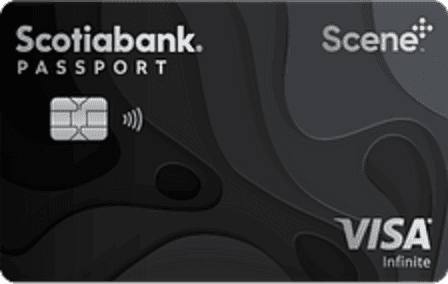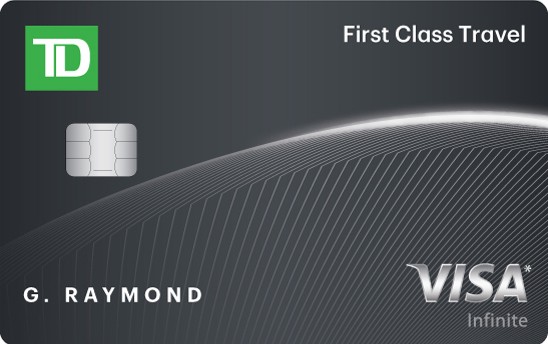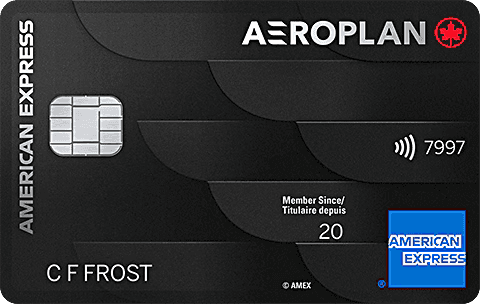How Does Credit Card Travel Insurance Work in Canada? A Complete Guide
Dec 31, 2025
Written by
Written by
Brianna Harrison (Credit Card & Travel Writer)
Brianna Harrison (Credit Card & Travel Writer)


Table of contents
Title
Title
Title
1When you travel outside of your home province, it’s usually a good idea to get travel insurance. However, if you’re on a budget, you probably don’t want to get a separate insurance policy whenever you travel.
If you’re a savvy traveller with a credit card that earns you rewards or cashback, chances are travel insurance is included. But what are you covered for, and how exactly does it work? In this article, we’ll dive into the world of credit card insurance and tell you everything you need to know for your next trip.
What is Credit Card Travel Insurance?
Credit card travel insurance is very similar to regular travel insurance, which covers you in the event of a medical emergency, flight delay or cancellation, lost bags, and so on. It’s basically a safety net for your travel plans, covering unexpected events that could disrupt your trip.
To get this coverage, you typically need to charge most or all of the ticket cost to your credit card. Each card has specific rules, limits, and exclusions, so check with your credit card company for the details before going on your trip.
There are generally two types of policies you can be covered for:
Travel medical insurance: Covers you for expenses related to your health, including a hospital or doctor’s visit.
Trip protection: Covers you for expenses related to delayed or cancelled flights, car rental loss or collision, and lost baggage.
Most travel credit cards include both types of insurance, but again, check with them before heading on your trip.
Types of Credit Card Travel Protection
Credit cards with travel insurance typically cover the following:
Out-of-province/country emergency medical insurance
This covers unexpected medical expenses if you get injured or sick while travelling outside your home province or Canada. It typically covers hospital stays, doctor visits, medications, and sometimes emergency medical evacuation back to Canada.
Typical coverage: Up to $1 to $5 million per trip. Coverage usually applies for trips lasting 15-31 days for younger travellers (under 65), with shorter limits for older people.
Trip cancellation insurance
This reimburses you for non-refundable trip costs if you need to cancel your trip before it starts. For example, if there is a natural disaster, death in the family, or unexpected illness or injury and you cancel the trip, you can get reimbursed for hotels, flights, and tours.
Typical coverage: Up to $1,500 - $2,000 per person, with a maximum of $5,000 per trip for all travellers.
Trip interruption insurance
If you need to cut your trip short and return home because of an emergency, you can be reimbursed for unused parts of your trip (e.g. hotel stays and activities) and additional costs for your trip back home.
Typical coverage: Up to $1,500 - $2,000 per person, with a maximum of $5,000 per trip.
Flight delay insurance
This covers any costs incurred if your flight is delayed for over 3-4 hours, including meals, transportation, hotel stays, and other items.
Typical coverage: $500 - $1,000 per trip.
Baggage delay insurance
If your checked baggage is delayed and you don’t have access to your personal belongings for a certain period (usually 6-12 hours+), you can get reimbursed for essential items, including clothes and toiletries.
Typical coverage: Up to $500 - $1,000 per person, per trip.
Lost or stolen baggage insurance
If your checked bags are damaged, stolen, or lost, you can be compensated for replacement items (clothes, toiletries, etc.), up to a certain amount.
Typical coverage: Up to $500 - $1,000 per person.
Hotel burglary insurance
If your valuables are stolen from your hotel room, you can get money back to replace your belongings, such as electronics, jewelry, or clothing.
Typical coverage: Up to $500 - $2,500 per trip.
Travel accident insurance
If, in the unlikely event you suffer a serious injury or accidental death while travelling by plane, train, or another common carrier, your close family members can receive financial compensation (typically up to $500,000).
Typical coverage: Up to $100,000 - $500,000 per person.
Car rental theft and damage insurance
If you rent a car and it gets stolen, damaged, or vandalized, this can cover the repair or replacement cost of the rental vehicle up to a certain limit.
Typical coverage: Up to the full cost of the rental vehicle.

How Does Credit Card Travel Insurance Work?
Most credit cards require you to purchase most or all of your flight and accommodation tickets using that credit card, or you won’t be covered. For example, many Scotiabank travel credit cards require you to book at least 75% of your ticket using that card, while American Express only covers you if you purchase the entire ticket using your credit card.
You can file an insurance claim on your credit card company’s website, though it may be processed by a third-party insurance provider. Generally, you’ll need to documentation, which can include:
Airline tickets
Proof of the delay, interruption, or cancellation
Receipts for any expenses incurred related to the claim (hotel stay, transportation costs, food, etc.)
Medical bills and hospital records
A list of what was in your luggage or hotel room and its value
Here are links with info on how to file insurance claims with the main credit card providers:
What Credit Cards Come With Travel Insurance?
Typically, all travel credit cards and some premium cards come with travel insurance.
A general rule of thumb is that if they have an annual fee or a minimum income requirement, they probably come with some sort of insurance. Before applying for a credit card, check to see which types and how much coverage it includes.
Best Credit Cards With Travel Insurance in Canada
Here are our top picks for the best credit cards with travel insurance:
Scotiabank Passport Visa Infinite Card

For a $150 annual fee, the Scotiabank Passport Visa Infinite Card comes with:
Travel emergency medical insurance: Up to $2M
Trip cancellation insurance: Up to $1,500 per person
Trip interruption insurance: Up to $2,500 per person
Flight delay insurance: Up to $500 per person
Delayed and lost baggage insurance: Up to $1,000 per person
Car rental collision loss/damage insurance: Up to $65,000
Hotel/motel burglary insurance: Up to $1,000
Travel accident insurance: Up to $500,000
Purchase security & extended warranty protection: Up to $60,000 lifetime liability
More info on the insurance coverage here.
You can also earn Scene+ points on every purchase and get amazing travel perks such as airport lounge access, no FX fees, and access to the Visa Infinite program.
TD First Class Travel Visa Infinite†

For a $139 annual fee, the TD First Class Travel Visa Infinite card† includes:
Travel medical insurance: Up to $2M for the first 21 days
Trip cancellation insurance: Up to $1,500 per person
Trip interruption insurance: Up to $5,000 per person
Flight delay insurance: Up to $500 per person
Delayed and lost baggage insurance: Up to $1,000 per person
Car rental collision loss/damage insurance: Coverage up to 48 days
Hotel/motel burglary insurance: Up to $2,500
Common carrier travel accident insurance: Up to $500,000
More info on the insurance coverage here.
Along with the extensive travel insurance coverage, you earn TD Rewards points on every purchase, get a $100 yearly travel credit, and get access to the Visa Infinite program.
$139 annual fee 21.99% purchase APR 22.99% cash advance APR
American Express Aeroplan Reserve Card

The American Express Aeroplan Reserve Card costs $599 per year, but it comes with extensive travel insurance:
Out-of-province/country medical insurance: Up to $5M for the first 15 days
Trip cancellation insurance: Up to $1,500 per person
Trip interruption insurance: Up to $1,500 per person
Flight delay insurance: Up to $1,000 per person
Baggage delay insurance: Up to $1,000
Hotel burglary insurance: Up to $1,000
Lost or stolen baggage insurance: Up to $1,000 per person
Car rental collision loss/damage insurance: Up to $85,000
Travel accident insurance: Up to $500,000
More info on the insurance coverage here.
On top of travel insurance, this credit card earns you Aeroplan points on every dollar, plus gets you amazing Air Canada and airport benefits, like lounge access, priority airport treatment, and travel credits.
American Express Platinum Card

For a $799 annual fee, the Amex Platinum travel insurance covers:
Out-of-province/country medical insurance: Up to $5M for the first 15 days
Trip cancellation insurance: Up to $2,500 per person
Trip interruption insurance: Up to $2,500 per person
Flight delay insurance: Up to $1,000 per person
Baggage delay insurance: Up to $1,000
Hotel burglary insurance: Up to $1,000
Lost or stolen baggage insurance: Up to $1,000 per person
Car rental collision loss/damage insurance: Up to $85,000
Travel accident insurance: Up to $500,000
More info on the insurance coverage here.
Besides travel insurance, this card comes with benefits like access to airport lounges, an annual travel and dining credit, and priority airport treatment.
If you’re a renter in Canada, sign up for Chexy to pay your rent with a credit card. Using a travel credit card, you’ll not only get access to extensive insurance coverage and travel benefits, but you’ll earn rewards, which can lead to free flights and travel upgrades.
Subscribe to our newsletter below for up-to-date credit card, travel, and rental content.
† Terms and Conditions apply.
1When you travel outside of your home province, it’s usually a good idea to get travel insurance. However, if you’re on a budget, you probably don’t want to get a separate insurance policy whenever you travel.
If you’re a savvy traveller with a credit card that earns you rewards or cashback, chances are travel insurance is included. But what are you covered for, and how exactly does it work? In this article, we’ll dive into the world of credit card insurance and tell you everything you need to know for your next trip.
What is Credit Card Travel Insurance?
Credit card travel insurance is very similar to regular travel insurance, which covers you in the event of a medical emergency, flight delay or cancellation, lost bags, and so on. It’s basically a safety net for your travel plans, covering unexpected events that could disrupt your trip.
To get this coverage, you typically need to charge most or all of the ticket cost to your credit card. Each card has specific rules, limits, and exclusions, so check with your credit card company for the details before going on your trip.
There are generally two types of policies you can be covered for:
Travel medical insurance: Covers you for expenses related to your health, including a hospital or doctor’s visit.
Trip protection: Covers you for expenses related to delayed or cancelled flights, car rental loss or collision, and lost baggage.
Most travel credit cards include both types of insurance, but again, check with them before heading on your trip.
Types of Credit Card Travel Protection
Credit cards with travel insurance typically cover the following:
Out-of-province/country emergency medical insurance
This covers unexpected medical expenses if you get injured or sick while travelling outside your home province or Canada. It typically covers hospital stays, doctor visits, medications, and sometimes emergency medical evacuation back to Canada.
Typical coverage: Up to $1 to $5 million per trip. Coverage usually applies for trips lasting 15-31 days for younger travellers (under 65), with shorter limits for older people.
Trip cancellation insurance
This reimburses you for non-refundable trip costs if you need to cancel your trip before it starts. For example, if there is a natural disaster, death in the family, or unexpected illness or injury and you cancel the trip, you can get reimbursed for hotels, flights, and tours.
Typical coverage: Up to $1,500 - $2,000 per person, with a maximum of $5,000 per trip for all travellers.
Trip interruption insurance
If you need to cut your trip short and return home because of an emergency, you can be reimbursed for unused parts of your trip (e.g. hotel stays and activities) and additional costs for your trip back home.
Typical coverage: Up to $1,500 - $2,000 per person, with a maximum of $5,000 per trip.
Flight delay insurance
This covers any costs incurred if your flight is delayed for over 3-4 hours, including meals, transportation, hotel stays, and other items.
Typical coverage: $500 - $1,000 per trip.
Baggage delay insurance
If your checked baggage is delayed and you don’t have access to your personal belongings for a certain period (usually 6-12 hours+), you can get reimbursed for essential items, including clothes and toiletries.
Typical coverage: Up to $500 - $1,000 per person, per trip.
Lost or stolen baggage insurance
If your checked bags are damaged, stolen, or lost, you can be compensated for replacement items (clothes, toiletries, etc.), up to a certain amount.
Typical coverage: Up to $500 - $1,000 per person.
Hotel burglary insurance
If your valuables are stolen from your hotel room, you can get money back to replace your belongings, such as electronics, jewelry, or clothing.
Typical coverage: Up to $500 - $2,500 per trip.
Travel accident insurance
If, in the unlikely event you suffer a serious injury or accidental death while travelling by plane, train, or another common carrier, your close family members can receive financial compensation (typically up to $500,000).
Typical coverage: Up to $100,000 - $500,000 per person.
Car rental theft and damage insurance
If you rent a car and it gets stolen, damaged, or vandalized, this can cover the repair or replacement cost of the rental vehicle up to a certain limit.
Typical coverage: Up to the full cost of the rental vehicle.

How Does Credit Card Travel Insurance Work?
Most credit cards require you to purchase most or all of your flight and accommodation tickets using that credit card, or you won’t be covered. For example, many Scotiabank travel credit cards require you to book at least 75% of your ticket using that card, while American Express only covers you if you purchase the entire ticket using your credit card.
You can file an insurance claim on your credit card company’s website, though it may be processed by a third-party insurance provider. Generally, you’ll need to documentation, which can include:
Airline tickets
Proof of the delay, interruption, or cancellation
Receipts for any expenses incurred related to the claim (hotel stay, transportation costs, food, etc.)
Medical bills and hospital records
A list of what was in your luggage or hotel room and its value
Here are links with info on how to file insurance claims with the main credit card providers:
What Credit Cards Come With Travel Insurance?
Typically, all travel credit cards and some premium cards come with travel insurance.
A general rule of thumb is that if they have an annual fee or a minimum income requirement, they probably come with some sort of insurance. Before applying for a credit card, check to see which types and how much coverage it includes.
Best Credit Cards With Travel Insurance in Canada
Here are our top picks for the best credit cards with travel insurance:
Scotiabank Passport Visa Infinite Card

For a $150 annual fee, the Scotiabank Passport Visa Infinite Card comes with:
Travel emergency medical insurance: Up to $2M
Trip cancellation insurance: Up to $1,500 per person
Trip interruption insurance: Up to $2,500 per person
Flight delay insurance: Up to $500 per person
Delayed and lost baggage insurance: Up to $1,000 per person
Car rental collision loss/damage insurance: Up to $65,000
Hotel/motel burglary insurance: Up to $1,000
Travel accident insurance: Up to $500,000
Purchase security & extended warranty protection: Up to $60,000 lifetime liability
More info on the insurance coverage here.
You can also earn Scene+ points on every purchase and get amazing travel perks such as airport lounge access, no FX fees, and access to the Visa Infinite program.
TD First Class Travel Visa Infinite†

For a $139 annual fee, the TD First Class Travel Visa Infinite card† includes:
Travel medical insurance: Up to $2M for the first 21 days
Trip cancellation insurance: Up to $1,500 per person
Trip interruption insurance: Up to $5,000 per person
Flight delay insurance: Up to $500 per person
Delayed and lost baggage insurance: Up to $1,000 per person
Car rental collision loss/damage insurance: Coverage up to 48 days
Hotel/motel burglary insurance: Up to $2,500
Common carrier travel accident insurance: Up to $500,000
More info on the insurance coverage here.
Along with the extensive travel insurance coverage, you earn TD Rewards points on every purchase, get a $100 yearly travel credit, and get access to the Visa Infinite program.
$139 annual fee 21.99% purchase APR 22.99% cash advance APR
American Express Aeroplan Reserve Card

The American Express Aeroplan Reserve Card costs $599 per year, but it comes with extensive travel insurance:
Out-of-province/country medical insurance: Up to $5M for the first 15 days
Trip cancellation insurance: Up to $1,500 per person
Trip interruption insurance: Up to $1,500 per person
Flight delay insurance: Up to $1,000 per person
Baggage delay insurance: Up to $1,000
Hotel burglary insurance: Up to $1,000
Lost or stolen baggage insurance: Up to $1,000 per person
Car rental collision loss/damage insurance: Up to $85,000
Travel accident insurance: Up to $500,000
More info on the insurance coverage here.
On top of travel insurance, this credit card earns you Aeroplan points on every dollar, plus gets you amazing Air Canada and airport benefits, like lounge access, priority airport treatment, and travel credits.
American Express Platinum Card

For a $799 annual fee, the Amex Platinum travel insurance covers:
Out-of-province/country medical insurance: Up to $5M for the first 15 days
Trip cancellation insurance: Up to $2,500 per person
Trip interruption insurance: Up to $2,500 per person
Flight delay insurance: Up to $1,000 per person
Baggage delay insurance: Up to $1,000
Hotel burglary insurance: Up to $1,000
Lost or stolen baggage insurance: Up to $1,000 per person
Car rental collision loss/damage insurance: Up to $85,000
Travel accident insurance: Up to $500,000
More info on the insurance coverage here.
Besides travel insurance, this card comes with benefits like access to airport lounges, an annual travel and dining credit, and priority airport treatment.
If you’re a renter in Canada, sign up for Chexy to pay your rent with a credit card. Using a travel credit card, you’ll not only get access to extensive insurance coverage and travel benefits, but you’ll earn rewards, which can lead to free flights and travel upgrades.
Subscribe to our newsletter below for up-to-date credit card, travel, and rental content.
† Terms and Conditions apply.
Disclaimer:
Financial institutions do not pay us for connecting them with customers. We may receive compensation in other ways, such as when someone applies for or is approved for a product. However, we do not receive payment for advertising, and not all products we list result in compensation for us. Advertisers are not responsible for the content on this site, including any editorial or review content that may appear. For complete and current information on any advertiser’s product, please visit their website.
Frequently Asked Questions
Frequently Asked Questions
How does Chexy help me earn rewards?
How does Chexy pay my bills?
How much does Chexy cost?
What credit cards does Chexy accept?
How does Chexy help me earn rewards?
How does Chexy pay my bills?
How much does Chexy cost?
What credit cards does Chexy accept?
How does Chexy help me earn rewards?
How does Chexy pay my bills?
How much does Chexy cost?
What credit cards does Chexy accept?
